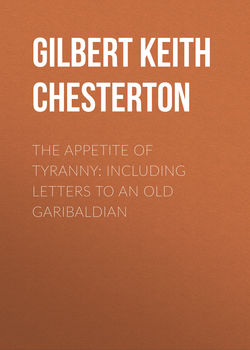The Appetite of Tyranny: Including Letters to an Old Garibaldian

Реклама. ООО «ЛитРес», ИНН: 7719571260.
Оглавление
Gilbert Keith Chesterton. The Appetite of Tyranny: Including Letters to an Old Garibaldian
THE FACTS OF THE CASE
I
II
III
IV
LETTERS TO AN OLD GARIBALDIAN
Отрывок из книги
It will hardly be denied that there is one lingering doubt in many, who recognise unavoidable self-defence in the instant parry of the English sword, and who have no great love for the sweeping sabre of Sadowa and Sedan. That doubt is the doubt whether Russia, as compared with Prussia, is sufficiently decent and democratic to be the ally of liberal and civilised powers. I take first, therefore, this matter of civilisation.
It is vital in a discussion like this, that we should make sure we are going by meanings and not by mere words. It is not necessary in any argument to settle what a word means or ought to mean. But it is necessary in every argument to settle what we propose to mean by the word. So long as our opponent understands what is the thing of which we are talking, it does not matter to the argument whether the word is or is not the one he would have chosen. A soldier does not say "We were ordered to go to Mechlin; but I would rather go to Malines." He may discuss the etymology and archæology of the difference on the march; but the point is that he knows where to go. So long as we know what a given word is to mean in a given discussion, it does not even matter if it means something else in some other and quite distinct discussion. We have a perfect right to say that the width of a window comes to four feet; even if we instantly and cheerfully change the subject to the larger mammals; and say that an elephant has four feet. The identity of the words does not matter, because there is no doubt at all about the meanings; because nobody is likely to think of an elephant as four foot long, or of a window as having tusks and a curly trunk.
.....
Now we, the French and English, do not mean this when we call the Prussians barbarians. If their cities soared higher than their flying ships, if their trains travelled faster than their bullets, we should still call them barbarians. We should know exactly what we meant by it; and we should know that it is true. For we do not mean anything that is an imperfect civilisation by accident. We mean something that is the enemy of civilisation by design. We mean something that is wilfully at war with the principles by which human society has been made possible hitherto. Of course it must be partly civilised even to destroy civilisation. Such ruin could not be wrought by the savages that are merely undeveloped or inert. You could not have even Huns without horses; or horses without horsemanship. You could not have even Danish pirates without ships, or ships without seamanship. This person, whom I may call the Positive Barbarian, must be rather more superficially up-to-date than what I may call the Negative Barbarian. Alaric was an officer in the Roman legions: but for all that he destroyed Rome. Nobody supposes that Eskimos could have done it at all neatly. But (in our meaning) barbarism is not a matter of methods but of aims. We say that these veneered vandals have the perfectly serious aim of destroying certain ideas which, as they think, the world has outgrown; without which, as we think, the world will die.
It is essential that this perilous peculiarity in the Pruss, or Positive Barbarian, should be seized. He has what he fancies is a new idea; and he is going to apply it to everybody. As a fact it is simply a false generalisation; but he is really trying to make it general. This does not apply to the Negative Barbarian: it does not apply to the Russian or the Servian, even if they are barbarians. If a Russian peasant does beat his wife, he does it because his fathers did it before him: he is likely to beat less rather than more as the past fades away. He does not think, as the Prussian would, that he has made a new discovery in physiology in finding that a woman is weaker than a man. If a Servian does knife his rival without a word, he does it because other Servians have done it. He may regard it even as piety, but certainly not as progress. He does not think, as the Prussian does, that he founds a new school of horology by starting before the word "Go." He does not think he is in advance of the world in militarism, merely because he is behind it in morals. No; the danger of the Pruss is that he is prepared to fight for old errors as if they were new truths. He has somehow heard of certain shallow simplifications; and imagines that we have never heard of them. And, as I have said, his limited but very sincere lunacy concentrates chiefly in a desire to destroy two ideas, the twin root ideas of rational society. The first is the idea of record and promise: the second is the idea of reciprocity.
.....